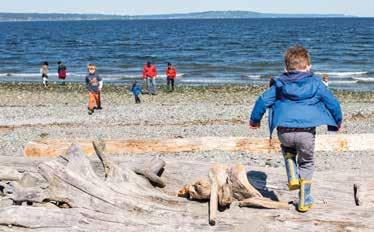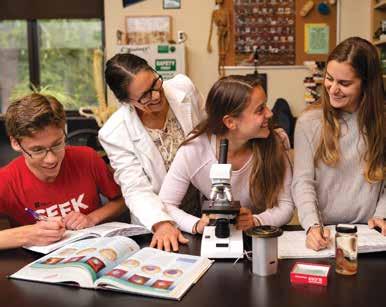
5 minute read
EDUCATION
Why You Should Try Gameschooling Your Kids
This fall, our kids are living in a whole new world of virtual learning, and many parents are looking for ways to supplement their children’s education in more fun, less stressful ways.
How can parents work with kids to learn new skills even after class has been dismissed? Enter a popular trend that’s gaining steam among virtual learning families: gameschooling. Whether you use it as your primary method of teaching your children or simply as a means to supplement your child’s virtual education, gameschooling will almost certainly be a great option for your family.
What is gameschooling? Just like it sounds, gameschooling is teaching through playing games. Whether it’s manufactured board games you buy or a game you create in your own home, it’s all about games, games, games.
Why should you consider gameschooling? Kids can only sit through lectures, educational videos and workbook sessions for so
long before they get antsy and lose focus. But games? Kids can play games for hours.
What can my child learn just by playing games? Even the most basic games (think Candy Land) teach young kids skills such as taking turns and practicing good sportsmanship. With a bit of research, you can take your kids’ game playing to a whole new level, finding games that teach specific subjects and upping the ante with games that require true strategy and critical thinking.
What about the three R’s? While some gameschooling families use games only to supplement instruction in areas where their kids are struggling, some homeschooling families choose to base their entire curriculum on gameschooling. Either way, when kids enjoy learning, they are much more likely to remember what they’ve learned and be able to incorporate that knowledge into their daily lives.
What if my children are at different ability levels? Having kids at different levels of ability doesn’t mean that they can’t play games together — in fact, playing games encourages teamwork and mentorship. Many games, such as Forbidden Island, have a cooperative option, meaning kids of different ages can work cooperatively to beat the game, as opposed to competing against one another. The act of teaching younger siblings a new skill or idea also reinforces knowledge that the older siblings already have.
How do I get started? Interested families can check out websites such as My Little Poppies (my-little-poppies.com) and Gameschool Academy (homeschoolgameschool.com), which are dedicated to gameschooling. These sites are filled with advice about what games are suitable for specific subjects, age groups and ability levels. In addition, parents can connect with Facebook groups that are focused on educating fellow parents about the many options available within the realm of gameschooling.
— Erin Smith

hearts minds






Virtual Open House November 22 – 2:00 pm

kingsschools.org 206.289.7783 • Shoreline, WA • Preschool – High School

Challenging K-12 students in an intellectual community through early Challenging K-12 students in entrance, outreach and online programs. an intellectual community Challenging K-12 students in an through early entrance, outreach intellectual community through early entrance, outreach and online programs. and online programs.

Challenging K-12 students in an intellectual community through early entrance, outreach and online programs.
Transition School • Early Entrance Program UW Academy • Online Courses Saturday Enrichment • Online Program Summer Programs • Professional Development Transition School • Early Entrance Program 206-543-4160 • rcys@uw.edu UW Academy • Online Courses Saturday Enrichment • Online Program Summer Programs • Professional Development Transition School • Early Entrance Program UW Academy • Online Courses Saturday Enrichment • Online Program Transition School • Early Entrance Program UW Academy • Online Courses 206-543-4160 • rcys@uw.edu Summer Programs Saturday Enrichment • Online Program Professional Development Summer Programs • Professional Development
206-543-4160 • rcys@uw.edu
continued from page 12 this might be hard. This might be sad. This might be disappointing. You know, you get a bad grade on the test or you don’t get to do the thing you want to do or you don’t think it’s fair. But inquire into what’s the opportunity here to learn and to grow, which is a form of gratitude in a way, taking a deeper inventory into how might this make me stronger and benefit me at some point, even if I can’t see it now,” says Robbins.
Nudging our children to rely upon social connections and strengthen their friendships will help them become kinder, more caring and more grateful individuals.
Embracing gratitude when life is hard During times like the present, when our lives are heavy with stress and worry, we may have to dig a little deeper to find that silver lining. “We need to shine our attention on the positives, especially when there’s so much that’s negative all around us. We’re all sad right now and our kids are feeling it deeply; they’re allowed to be angry, and we have to let them talk about their emotions, but then shift to the positives,” says Carter.
Lockdown is stressful, and we all have cabin fever, but it’s also a unique opportunity to be together as a family. “This is the most amount of time my wife and I are going to spend with our girls, probably ever. As stressful and as challenging as it is right now, I’m trying to enjoy it and be as grateful as I can. It’s beautiful and it’s brutal at the same time. I keep saying to my girls, ‘Pay attention right now, because you’re going to be telling this story for the rest of your lives. What’s the story you want to tell, when this is all over, about how you showed up and how this experience was for you, because we can’t actually control the circumstances of the pandemic, but we can absolutely control our attitude and how we show up during it,” says Robbins.
With every act of kindness, consideration and appreciation we bestow upon others, we silently inspire our kids to follow suit, so go and do some good in the world. Shine a spotlight on the things that bring you joy every day, no matter how small, because there’s always beauty and grace to be found; we just have to keep our eyes open. Encourage your kids to spread their wings — believe in them, love them and be their rock. Even when life knocks us down, there’s always something to be thankful for. Gratitude awaits. ■ Heidi Lynn Borst is an active mom, journalist and nutrition coach with a strong affinity for nature, sarcasm and extra sleep.



